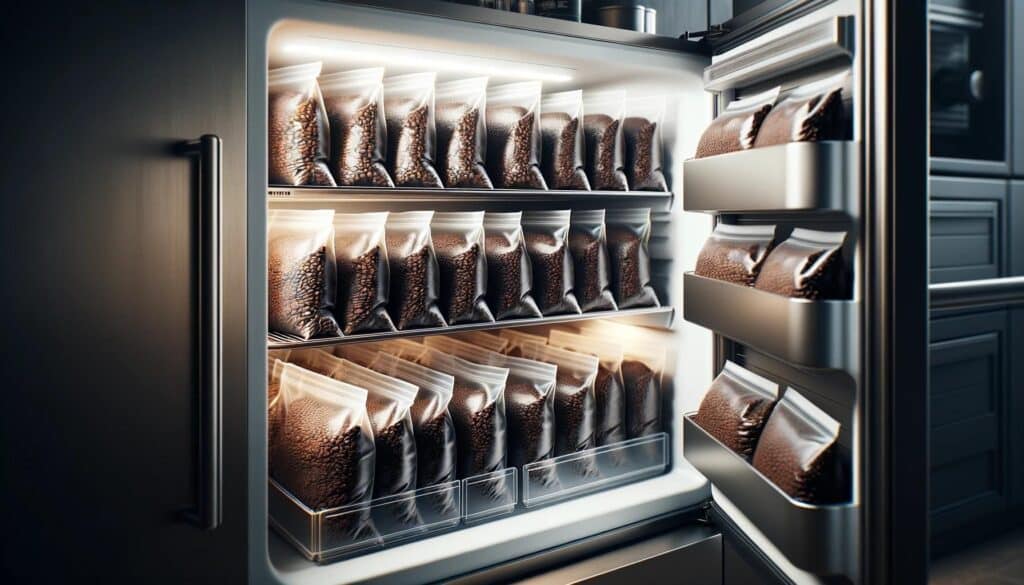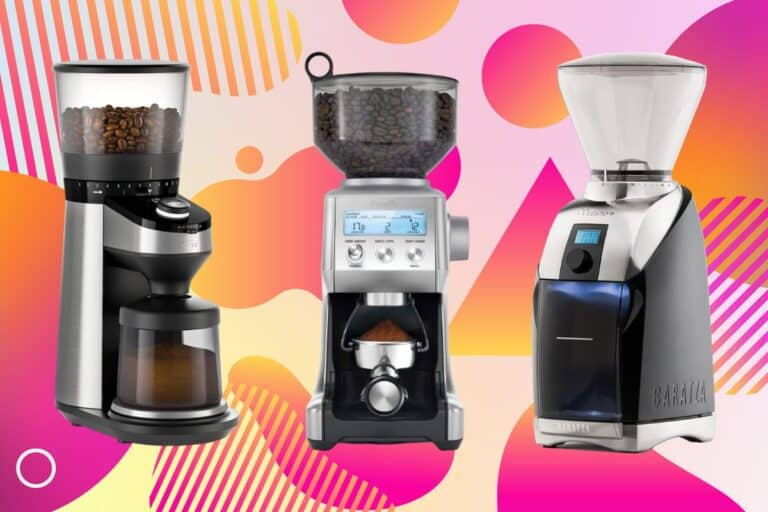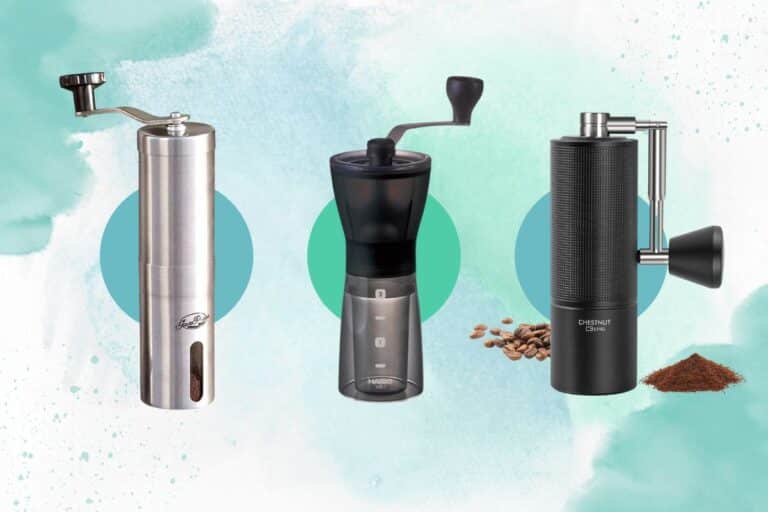Imagine coffee as that one friend who’s always there to kickstart your day with a boost or to share a cozy moment with buddies. It’s not just a drink; it’s a warm hug in a mug, a daily ritual, and for many, a necessity to tackle the day. Around the world, coffee is a big deal – it brings people together, fuels our hustle, and has its own special place in cultures far and wide.
Now, think about trying to keep that coffee magic alive for as long as possible. That’s where the idea of freezing coffee comes in, whether it’s the whole beans or the actual brew. The goal? To keep your coffee tasting fresh and delicious, ready to wake you up or warm your soul whenever you need it, without running to the coffee shop.
But, freezing coffee is a bit like putting on a superhero cape on it. Some coffee fans swear by it, saying it’s their secret to keeping coffee perfect. Others are not so sure, worrying it might mess with the coffee’s superhero powers – its unique flavors and comforting aroma. They wonder if the cold might change the coffee’s character, affecting the oils and moisture that give it its special taste.
The truth is, both sides have a point. Freezing coffee can be a great way to keep it fresh, but it’s not just about tossing it into the freezer. There’s a bit of science to it – how you freeze it and what you freeze can make all the difference. Plus, many coffee lovers have tried it out and have tips and tricks to share.
So, whether you’re someone who enjoys an occasional cup or someone who can’t imagine a day without it, exploring the world of freezing coffee could open up new possibilities. It’s about finding new ways to make sure you can always enjoy your coffee, just the way you like it, any time of the day.
Can I Freeze My Coffee?
Yes, you can freeze coffee to extend its shelf life, preferably in whole bean form using airtight containers to prevent flavor loss and absorption of odors. Portion the coffee before freezing to thaw only what you need, minimizing quality degradation from repeated freeze-thaw cycles. For best results, use the frozen coffee within a couple of months and allow it to thaw completely at room temperature before brewing.
The Basics of Freezing Coffee

Freezing coffee, whether in its bean form or as a brewed beverage, is a topic of interest for those looking to prolong the enjoyment of their favorite coffee without losing its essence. Understanding what happens when coffee is frozen, and the differences between freezing coffee beans versus brewed coffee, is essential for anyone considering this preservation method.
What Happens When Coffee is Frozen
Freezing coffee slows down the degradation processes that affect its flavors and aromas. At the core, freezing works by reducing the activity of the molecules responsible for staleness and rancidity. For coffee beans, freezing halts the oxidation process, wherein the essential oils—which give coffee its distinct flavors and aromas—react with air. This reaction is significantly slowed in the freezer, preserving the beans’ freshness for a longer period.
For brewed coffee, freezing captures a specific taste profile at a particular moment. Since brewed coffee starts to lose its peak flavors within hours after brewing, freezing it can help retain its quality. However, the presence of water introduces the risk of ice crystal formation, which can affect the taste and texture upon thawing.
Differentiating Between Freezing Brewed Coffee and Coffee Beans
The primary difference between freezing coffee beans and brewed coffee lies in their susceptibility to freezer conditions. Coffee beans are dense and contain less moisture, making them less likely to absorb freezer odors or form ice crystals that can lead to flavor degradation. In contrast, brewed coffee contains a significant amount of water, which expands when frozen and can potentially alter the coffee’s mouthfeel and flavor intensity.
Another critical difference is in the application. Frozen coffee beans are intended to be thawed and then brewed, offering a fresh coffee experience. Frozen brewed coffee, however, is often used for convenience, such as being directly thawed for iced coffee or reheated for a quick hot coffee without the brewing process.
The Science Behind Coffee Preservation
Freezing coffee is like pressing the pause button to keep it fresh. This trick helps coffee stay good for longer by slowing down the changes that usually make food spoil. For coffee beans, this means keeping their special flavors and smells safe. And for coffee you’ve already made, it means keeping its taste as close as possible to when you first brewed it.
But, getting this right isn’t just about throwing your coffee in the freezer. The quality of your coffee, how you freeze it, and where you keep it all matter a lot. You need to make sure your coffee is packed tight in containers that don’t let air or moisture sneak in, as these can make your coffee taste off or get freezer burn.
In short, freezing coffee—whether it’s beans or brewed—can be a great way to make sure you always have a tasty cup on hand. But to do it well, you need to know a bit about the best ways to freeze and store it. With a little care, you can enjoy your coffee just as much later, without losing any of the flavors that make it so great.
Pros and Cons of Freezing Coffee

Freezing coffee, whether as beans or in its brewed form, is a technique embraced by many to preserve the taste and freshness of coffee over extended periods. However, like any preservation method, it comes with its own set of advantages and disadvantages. Here, we explore the pros and cons of freezing coffee, offering insights to help you decide whether this method suits your coffee consumption habits and preferences.
For Coffee Beans
Pros:
- Extended Shelf Life: Freezing coffee beans can significantly extend their shelf life, allowing you to buy in bulk and store for future use without worrying about the beans going stale quickly.
- Retention of Freshness Over Time: When properly stored, frozen coffee beans can retain a significant amount of their original flavor and aroma, making it possible to enjoy a high-quality cup of coffee even months after the beans were originally purchased.
Cons:
- Risk of Flavor Loss Due to Moisture and Freezer Odors: If not stored correctly, coffee beans can absorb odors from the freezer, which can alter their flavor. Moisture can also seep into the beans, leading to freezer burn or the development of ice crystals that affect the beans’ integrity.
- Proper Storage Techniques Are Crucial: To avoid the aforementioned risks, coffee beans must be stored in air-tight, moisture-proof containers. This requires some effort and the right materials to ensure the beans are protected from the elements of the freezer.
For Brewed Coffee
Pros:
- Convenience of Ready-Made Coffee: Freezing brewed coffee allows for a quick and convenient way to enjoy a cup of coffee without going through the brewing process, particularly useful for those with busy schedules.
- Preservation of Flavor for a Short Period: While the flavor of brewed coffee begins to deteriorate hours after brewing, freezing can help preserve its taste for a short period, making it a viable option for those looking to save leftover coffee.
Cons:
- Potential for Ice Crystal Formation Affecting Taste: The water in brewed coffee can form ice crystals when frozen, which may alter the coffee’s texture and flavor once thawed, potentially leading to a less pleasant drinking experience.
- Best Practices for Freezing and Thawing: To minimize the impact of freezing on brewed coffee, it’s important to follow best practices for freezing and thawing, such as using ice cube trays for easy portioning and avoiding reheating coffee multiple times.
In summary, freezing coffee, whether beans or brewed, can be a practical method for extending its shelf life and ensuring a ready supply of your favorite brew. However, the effectiveness of this method depends largely on the correct storage techniques and understanding the potential impact on coffee’s taste and quality. Whether the convenience and benefits outweigh the potential downsides is a matter of personal preference and lifestyle.
How to Freeze Coffee Beans

Freezing coffee beans can be an effective way to preserve their freshness and flavor for extended periods. However, the process involves more than just placing your coffee beans into the freezer. Proper techniques and storage solutions are crucial to prevent flavor loss, moisture absorption, and freezer burn. Here’s a detailed guide on how to freeze coffee beans effectively.
Choosing the Right Containers for Freezing
- Airtight Containers: The primary goal is to protect the beans from freezer odors and prevent moisture from getting in. Use airtight containers made from materials like glass or hard plastic. Containers specifically designed for freezer storage are ideal.
- Vacuum-Sealed Bags: For long-term storage, vacuum-sealing your coffee beans can significantly reduce their exposure to air, which slows down the oxidation process. Vacuum-sealed bags are especially effective in preserving the beans’ original flavors and aromas.
- Freezer Bags: If vacuum-sealed bags are not an option, high-quality freezer bags can also work. Just make sure to squeeze out as much air as possible before sealing.
Pre-Freezing Tips: Portioning and Sealing
- Portioning: Divide your coffee beans into weekly or daily servings, depending on your consumption. Freezing in small portions ensures you only thaw the amount you need, preventing freeze-thaw cycles that can degrade the beans’ quality.
- Sealing: Ensure the sealing is perfect to avoid any air leaks. If using freezer bags, you might double-bag for extra protection. With containers, check the seals for any possible entry points for air or moisture.
- Labeling: Label each container or bag with the date of freezing. This practice helps in managing your stock by using the oldest beans first and understanding how different freezing durations affect flavor.
Recommended Storage Duration for Optimal Flavor
- Short to Medium Term: For optimal flavor, it’s recommended to use the frozen coffee beans within three to six months. While freezing can preserve the beans for longer, the longer they are stored, the more they risk losing their peak flavors.
- Long-Term Storage: If you must store coffee beans for more than six months, ensure they’re vacuum-sealed. This method can extend their freshness up to a year without significant flavor degradation, though the optimal taste is best enjoyed within the shorter recommended timeframe.
Additional Tips for Success
- Avoiding Condensation: Allow the beans to come to room temperature before opening their container or bag after removing them from the freezer. This process reduces condensation, which can affect the beans’ surface and flavor.
- Rotation: Practice first-in, first-out with your coffee bean stock to ensure you’re always using the freshest beans.
- Experimentation: Keep notes on how different types of beans respond to freezing. This personalized record can help refine your freezing process to better suit your taste preferences.
By following these guidelines, you can effectively freeze coffee beans, preserving their freshness and ensuring a delicious cup of coffee every time.
How to Freeze Brewed Coffee

Freezing brewed coffee can be a game-changer for those looking to save time without sacrificing their daily coffee ritual. Whether you’re preserving leftover coffee or preparing for busy mornings, the method you choose and how you thaw and reheat your coffee can significantly impact the taste and quality of your brew. Here’s how to freeze brewed coffee effectively, along with some tips to ensure the best possible results.
Best Methods for Freezing
- Ice Cube Trays: Ideal for single servings, ice cube trays allow you to freeze coffee into convenient portions. Once frozen, transfer the coffee cubes into a freezer bag or an airtight container to prevent freezer burn and odor absorption. Coffee ice cubes are perfect for iced coffee—simply add them to a glass of milk or water, and as they melt, they’ll gradually infuse it with coffee flavor without dilution.
- Airtight Containers: If you prefer to freeze larger quantities of brewed coffee, airtight containers are the way to go. Leave some space at the top as liquids expand when frozen. This method is suitable for those who plan to thaw and drink the coffee hot or use it in recipes that call for coffee.
Tips on Thawing and Reheating Frozen Brewed Coffee
- Thawing: For the best flavor, thaw your coffee overnight in the refrigerator if you’re using a container. If in a rush, you can also thaw it at room temperature for a few hours. Coffee ice cubes can be used directly without thawing for iced drinks.
- Reheating: To reheat thawed coffee, use a stovetop or microwave, but avoid boiling it, as this can lead to a bitter taste. Heat it gently until just warm enough to enjoy. For coffee ice cubes, there’s no need to reheat when adding them to cold drinks.
How Freezing Impacts Different Types of Coffee Drinks
- Espresso and Strong Brews: Freezing can preserve the robust flavors of espresso and strong brews fairly well, especially if used in coffee cubes for iced lattes or similar drinks. However, reheating thawed espresso might not fully recapture the fresh taste and crema of a freshly pulled shot.
- Cold Brew: Due to its already chilled nature and concentrated flavor, cold brew coffee freezes well and thaws with minimal flavor loss. It’s perfect for freezing in ice cube trays for a quick, cold beverage or for a gradual flavor boost in iced drinks.
- Milky Coffee Drinks: For coffee drinks that already contain milk, such as lattes or cappuccinos, freezing can alter the texture and consistency due to the separation of milk components. It’s best to freeze plain coffee and add fresh milk upon serving.
Additional Considerations
- Quality Over Time: While freezing brewed coffee is convenient, it’s best consumed within a month to enjoy the closest to its original taste and quality.
- Experimentation: Freezing may affect the taste of different coffee roasts and brews in varying ways. Experiment with small quantities to find out what works best for your palate and preferred coffee type.
By understanding the nuances of freezing brewed coffee, from the method of freezing to the thawing and reheating process, you can ensure your coffee remains a delightful and convenient part of your routine, regardless of your busy schedule.
Conclusion: Navigating the Do’s and Don’ts of Freezing Coffee
Freezing coffee, be it in bean form or brewed, offers a practical solution for extending its shelf life and ensuring you have access to your favorite brew at any time. However, to preserve the essence of your coffee—its rich flavors and aromas—certain practices are recommended while others are best avoided. Here’s a concise summary of the do’s and don’ts, along with personal recommendations on optimizing the freezing process.
Do’s:
- Do use airtight containers or vacuum-sealed bags to store coffee beans or brewed coffee in the freezer to protect against moisture and odors.
- Do portion your coffee before freezing, especially brewed coffee, to easily thaw only what you need.
- Do label your coffee with the freezing date, ensuring you use older stocks first and enjoy your coffee at its best.
- Do allow frozen coffee beans to come to room temperature before opening the container to prevent condensation.
- Do experiment with freezing different types of coffee to discover what works best for your taste preferences and consumption habits.
Don’ts:
- Don’t freeze coffee in large batches without portioning, as repeatedly thawing and refreezing can degrade its quality.
- Don’t leave coffee in the freezer for too long. While freezing can extend coffee’s shelf life, aim to use frozen beans within three to six months and brewed coffee within a month for the best taste.
- Don’t reheat coffee multiple times after thawing, as this can lead to a burnt taste and diminished flavor.
- Don’t freeze coffee with milk or cream already mixed in, as the freezing and thawing process can affect the texture and consistency of the milk.
Personal Recommendation
Think of freezing coffee beans like packing little treasure chests full of flavor for future you. You want to split your bounty into small, weekly batches, sealing them away in airtight, vacuum-sealed bags like you’re locking away the freshness for a special occasion. This trick keeps the air and moisture, which are like flavor thieves, away from your precious beans. When you’re ready for your next coffee adventure, just pick a batch to thaw overnight at room temperature, and voilà, you’ve got beans ready to make the perfect cup.
Now, if you’re someone who loves a cold brew on a hot day, the ice cube tray method is your secret weapon. Imagine turning your brewed coffee into little frozen cubes of joy. These cubes are perfect for cooling down and adding a kick to your milk or water without watering it down—pure genius for an instant refreshment. And for those chilly mornings when you still want your coffee hot, try freezing your brew in small, individual portions. When you reheat them, just remember to do it gently, so you don’t lose that beloved taste.
Mastering the freeze is a mix of creativity and a little know-how. Stick to these steps, and you’re all set to weave some magic into your coffee routine, keeping it fresh, convenient, and just the way you like it. Whether you’re just enjoying your daily cup or diving deep into the coffee connoisseur life, freezing coffee can fit right into your world, making sure you’re always just a step away from a great coffee moment.
Frequently Asked Questions About Freezing Coffee
Can I freeze coffee with milk or creamer in it?
It’s not recommended to freeze coffee with milk, creamer, or any dairy alternatives already mixed in. Freezing can cause separation and texture changes in the milk, leading to a less than desirable consistency upon thawing. For the best quality, freeze black coffee and add fresh milk or creamer after thawing.
How long can I keep coffee in the freezer?
For coffee beans, it’s best to use them within three to six months of freezing to enjoy their optimal flavor and aroma. Although they can be stored for longer, the quality may gradually decline over time. Brewed coffee should ideally be consumed within a month of freezing for the best taste. Remember, the longer coffee is stored in the freezer, the more it’s at risk of absorbing freezer odors or suffering from freezer burn.
Does freezing coffee beans affect their grind quality?
Freezing coffee beans does not significantly affect their grind quality. However, it’s essential to bring the beans to room temperature before grinding to prevent any condensation from forming, which could potentially affect your grinder’s performance or the grind consistency. Some experts even advocate grinding the beans while they’re still cold, claiming it can lead to a finer and more uniform grind.
Can I refreeze coffee after thawing?
Refreezing coffee, whether beans or brewed, is not recommended. For beans, repeated freeze-thaw cycles can introduce moisture and cause the beans to deteriorate faster. For brewed coffee, refreezing can further break down the coffee’s structure, affecting its flavor and aroma. It’s best to thaw only the amount of coffee you plan to use to avoid the need for refreezing.
Is it better to freeze coffee beans whole or ground?
It’s better to freeze coffee beans whole. Whole beans have a lower surface area exposed to air, moisture, and odors, helping to preserve their freshness and flavor for a longer period. Grinding coffee increases its surface area, making it more susceptible to oxidation and flavor loss, even when frozen.
Can freezing coffee help me save money?
Yes, freezing coffee can help you save money by allowing you to buy in bulk, take advantage of sales, or preserve excess coffee that might otherwise go to waste. By extending the shelf life of both coffee beans and brewed coffee, freezing can help ensure you always have coffee on hand without frequent trips to the store or coffee shop, maximizing both convenience and cost-efficiency.
How should I thaw frozen coffee for the best results?
Thaw coffee beans at room temperature inside their airtight container or bag to prevent condensation. For brewed coffee, thaw it in the refrigerator overnight or at room temperature for a few hours. Thawing slowly helps preserve the coffee’s flavor. Always avoid direct heat or rapid thawing methods, as they can degrade the quality of your coffee.






